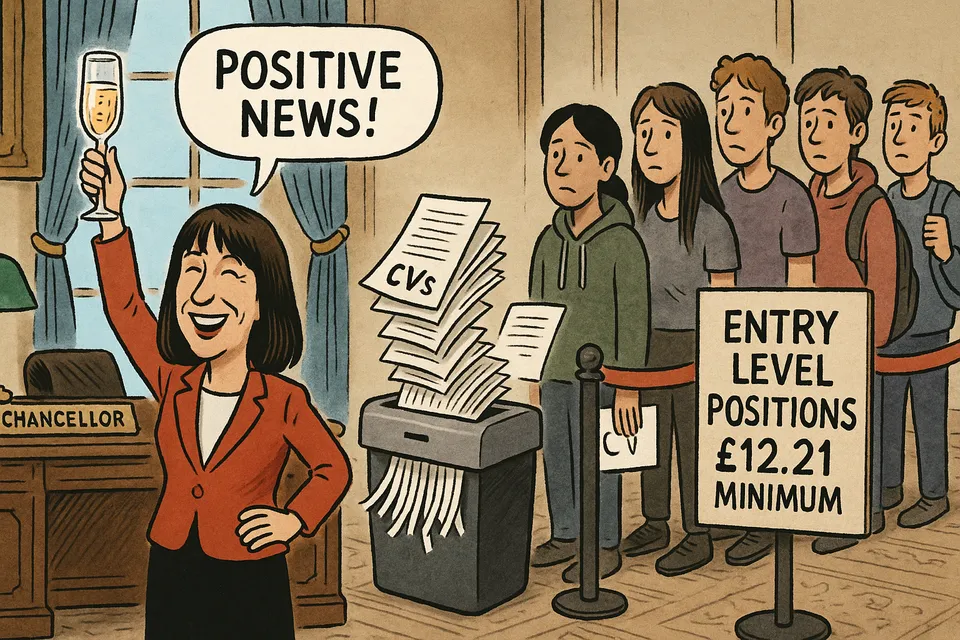The Jobs Market Reality Check: When "Positive News" Means 718,000 Fewer Opportunities

Suspicious Discrepancy Between Political Rhetoric and Economic Reality
While Chancellor Rachel Reeves claimed there was "really positive news" in Tuesday's jobs data, British employers eliminated another 8,000 positions last month and job vacancies collapsed to their lowest level since the pandemic lockdowns. This is what passes for economic success in modern Britain: unemployment stuck at a four-year high becomes an achievement worth celebrating.
The Office for National Statistics revealed that job vacancies plummeted to 718,000 between May and July - a 5.8% drop that marks the lowest level since April 2021, when the country was still emerging from Covid restrictions. Outside the pandemic, you have to go back a full decade to January 2015 to find fewer opportunities for British workers.
Here’s what actually happened: employment has now fallen in 10 of the last 12 months. The sectors hit hardest - hospitality and retail - are precisely where young people and lower-income workers traditionally find their first opportunities. The unemployment rate remains frozen at 4.7%, its highest level in four years, while politicians congratulate themselves on “stabilising” the economy.
The government’s April tax raid tells the real story. National Insurance contributions for employers jumped from 13.5% to 15%, while the threshold triggering payment was slashed from £9,100 to £5,000. Simultaneously, the minimum wage rose to £12.21. The predictable result: businesses stopped hiring, particularly the young and inexperienced who now cost too much to train.
The Political Theatre of Economic Decline
In any functioning democracy, a minister would struggle to explain how unemployment at a four-year high constitutes “positive news.” But Education Minister Baroness Jacqui Smith went further, claiming these job-destroying tax increases had somehow “stabilised” the economy. This represents the complete inversion of economic reality that characterises British political discourse: policies that destroy jobs are rebranded as stabilisation measures.
The Scottish hospitality executive quoted by the BBC spelled out what this means at ground level: her business now finds 17 and 18-year-olds “less attractive” to hire because the economics no longer work. Young people without experience have been priced out of the labour market by the very policies supposedly designed to help workers. This is social mobility in reverse - the ladder’s bottom rungs have been sawn off by ministerial decree.
The Pattern of Managed Decline
What we’re witnessing follows a familiar British pattern: create a crisis through policy failure, then claim credit for managing the consequences. The government raises employment costs, businesses predictably stop hiring, unemployment rises, then ministers celebrate the “gradual” nature of the decline as if it were an achievement.
Former Bank of England policymaker Andrew Sentance’s observation that this represents merely a “very gradual cooling” reveals how normalised economic stagnation has become among the British establishment. When your frame of reference is perpetual decline, any deceleration in the rate of decay looks like progress.
The ONS itself admits its payroll data should be “treated with caution” and is taking “additional steps” to address data quality concerns. Translation: even the statistics we’re using to measure this decline may be unreliable. Britain has reached the point where we can’t accurately count how many people are losing their jobs.
The Competitiveness Death Spiral
Look beyond the immediate numbers to the structural damage being inflicted. Britain now has the worst combination possible for economic growth: high employment costs that discourage hiring, combined with stagnant productivity that prevents wage growth from translating into improved living standards. Average wages may be growing at 5%, but with fewer people working and inflation eroding purchasing power, household prosperity continues its inexorable decline.
The hospitality sector’s response - explicitly discriminating against young workers in favour of experienced staff who can “hit the ground running” - reveals how government policy has created perverse incentives that lock out those who most need opportunity. This isn’t a bug in the system; it’s the predictable outcome of politicians who prioritise revenue extraction over economic dynamism.
Capital Economics’ Ashley Webb suggests the “fallout” from business tax rises is “calming down.” This framing accepts permanent economic damage as the new normal. We’re not recovering from these policy choices; we’re simply adjusting to a lower equilibrium where fewer businesses hire, fewer young people find work, and economic opportunity continues to concentrate among the already established.
What Competent Governance Would Look Like
A government serious about employment would recognise that making workers more expensive doesn’t help workers - it helps those already in secure positions while shutting out newcomers. Competent policy would lower barriers to hiring, particularly for young and inexperienced workers who need that first opportunity. Tax policy would incentivise job creation, not punish it.
Instead, Britain has a Chancellor who looks at four-year-high unemployment and calls it positive news, while her education minister credits job-destroying tax rises with “stabilising” an economy that’s steadily eliminating opportunities for the next generation.
The Reality Behind the Rhetoric
The Bank of England will likely cut interest rates again this year - not because the economy is thriving, but because it’s cooling so rapidly that monetary stimulus is needed to prevent outright contraction. This is management of decline, not economic strategy.
When politicians celebrate 718,000 job vacancies as positive news, when unemployment at a four-year high becomes an achievement, when pricing young people out of the job market is reframed as economic stabilisation, we’re no longer discussing policy failure. We’re documenting the psychological adaptation to permanent decline, where each new low becomes the baseline for measuring success.
The British jobs market isn’t cooling - it’s suffocating under the weight of political decisions that prioritise short-term revenue over long-term prosperity. And the most revealing aspect isn’t the decline itself, but the determination of those responsible to rebrand it as progress.
Commentary based on UK jobs market cools as vacancies fall by Tom Espiner on BBC News.